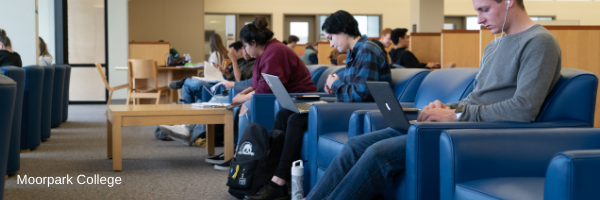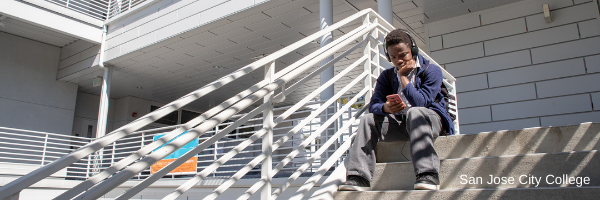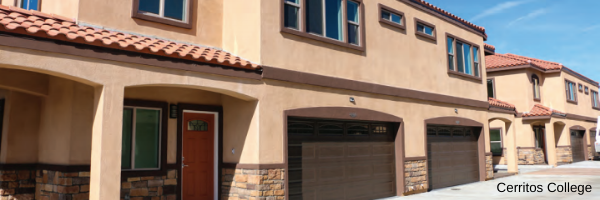In this Issue:
- Deciphering This Year’s Budget Process
- An Update on Community College Related Legislation
- Congress Moves Forward with Community Project Funding
- Addressing the Housing Affordability Crisis for CCC Students
- Join Us for our Next GR Webinar: Tuesday, March 16 at 11:00 a.m.
- Federal Grant Opportunities
- Upcoming Events
Deciphering This Year’s Budget Process
In the midst of the pandemic, the Legislature has made numerous adjustments to the process of decision-making, most notably reducing the number of bills under consideration and allowing for remote testimony. While the state budget continues to abide by constitutionally mandated deadlines, there have been notable changes to the budget process this year.
When the Administration revealed in January that the state was sitting on a substantial one-time surplus, it set forth plans for a two-step budget process: an Early Action Budget Package in February followed by the regular budget in June. Governor Newsom signed The Golden State Stimulus plan on Tuesday, February 23rd, which included three items for community colleges:
- $100 million in emergency financial aid for qualifying low-income students carrying six or more units.
- $20 million to reengage students who have left their studies because of the pandemic or to engage students at risk of leaving.
- $3.1 million to financial aid administration to increase CalFresh enrollments.
Below was the League’s media statement on The Golden State Stimulus plan:
“The Community College League of California commends the Legislature and Administration for their support of community college students in the Golden State Stimulus. Investing in our community colleges is key to an equitable recovery and we look forward to working together with lawmakers in the months ahead to ensure that our institutions remain a priority in the 2021-22 Budget Act,” said Dr. Larry Galizio, President & CEO for the Community College League of California.
For more information about the Golden State Stimulus, click here.
Since the Legislature is limiting the use of the Capitol’s hearing rooms to those which can accommodate appropriate social distancing, it has had to substantially rearrange schedules of all the standing and select committees, as well as the subcommittees which deliberate over the community college budget. As such, the schedule for pre-May Revise hearings on our budget—which are largely informational—has been substantially condensed with the Senate having already concluded and the Assembly nearly done. There is, however, a “Grab Bag” Hearing on Tuesday, March 16 to discuss miscellaneous items in all segments of education from Pre-K through university. It is impossible to say at this time how many hearings will be scheduled following the May Revise as those have yet to be announced.
Meet with Your Legislators
Now is the time to meet with your legislators to discuss the Governor’s January budget. We encourage you to review the League’s priorities and make a case for more ongoing operating resources, increased local flexibility in budgeting, and a complete buy-down of deferrals. Although votes on the budget will not be taken before the May Revise, the current lag in the hearing schedule presents a great opportunity to keep our issues in front of lawmakers. Stay current on budget issues through the League’s website, and be prepared for another round of advocacy once the May Revise is released.
An Update on Community College Related Legislation
With the bill introduction deadline passed, legislators will now consider over 2,500 bills introduced via their policy committees. These committees are expected to meet less often due to safety measures being taken due to the COVID-19. Opportunities to testify will be virtual or over the phone, and advocates are highly encouraged to send in their position letters through the Position Letter Portal: https://calegislation.lc.ca.gov/Advocates/
The two committees of primary jurisdiction for community colleges will be the Senate Education Committee and the Assembly Higher Education Committee. They will consider the policy implications of each measure and then pass it along to the fiscal committees to analyze the costs of the bills.
The League has identified a number of bills of interest that we were not able to include in our February newsletter. Below is a summary of some of the legislative measures the League is tracking, including measures related to the community college baccalaureate degree, ethnic studies, and a bill focused on expanding student trustee rights. For a full list, click here.
Academic Affairs:
AB 927 (Medina) Community College Baccalaureate Degree Programs
Would remove the current sunset date on the California community college degree baccalaureate degree program and would expand eligibility for all community colleges to participate.
AB 1115 (Choi) Community College Baccalaureate Degree Programs
Would extend the current sunset date of the community college baccalaureate degree program by one year to 2027.
AB 1040 (Muratsuchi) Ethnic Studies
Starting in the 2022-23 academic year, this bill would mandate community colleges to require a three-unit ethnic studies class for graduation.
Fiscal and Funding:
AB 421 (Ward) CDCP Reimbursement Rates
Would permit Career Development College Preparation (CDCP) courses to be funded via positive attendance or on a census date apportionment.
Governance:
1216 (Salas) Student Trustees
Would create certain mandated rights for student trustees:
- Mandated advisory vote (currently permissible under state law).
- Mandated motions and seconds (currently permissible under current law).
- Equal pay between student trustees and their community elected peers.
- Participation in closed sessions on issues other than personnel matters or collective bargaining.
Additionally, it would require the Chancellor’s Office to form a workgroup of constituents to study the feasibility of a full vote for student trustees.
Congress Moves Forward with Community Project Funding
Congressional leaders have moved to end the temporary moratorium on congressionally directed spending, or “earmarks.” A new opportunity for directed spending, known as “Community Project Funding,” launched this month on Capitol Hill. This new process creates funding opportunities for community colleges as well as other public and nonprofit entities.
A Brief History on Earmarks
From 1995 through 2010, an annual practice of funding special projects through legislation became known as “earmarking.” Earmarks permitted a member of Congress or Senator to designate an entity or special project for line-item spending or another direct federal benefit through legislation.
During the late 2000s, earmarks became thorny. Notably, news media spotlighted allegedly wasteful federal spending on a so-called “Bridge to Nowhere” in Alaska. In reality, the bridge would have carried motor vehicles to and from Gravina Island, on which the Ketchikan Airport is located. Nevertheless, the myth of the Bridge to Nowhere, together with the rise of the Tea Party movement and the Republican takeover of the U.S. House of Representatives following the 2010 elections, were factors that led to a ban on earmarking.
In 2011, Congress instituted what has been referred to as the “temporary earmark moratorium.” Under the moratorium, a member of Congress who introduced an earmark request did so at his or her own peril—risking a referral to the Ethics Committee for investigation. The temporary earmark moratorium has remained in place for a decade.
Congress is now ending the earmark moratorium with the creation of Community Project Funding. In launching this new spending practice, the House Appropriations Committee is enforcing a series of reforms intended to ensure that Community Project Funding is dedicated to genuine need and not subject to abuse. Community Project Funding emphasizes community engagement, public transparency and accountability.
Take Action Now
Community Project Funding presents an opportunity for California Community Colleges to engage with congressional leaders to seek support for funding of priority initiatives, and particularly for projects that are already mapped out. Community college districts should consider meeting with their congressional delegations now to discuss projects that could qualify for Community Project Funding.
For guidance on how to navigate the process for Community Project Funding, contact League consultant Tom Downs at TCDowns@downsgovaffairs.com.
Addressing the Housing Affordability Crisis for CCC Students
Since 2018, the Affordability, Food & Housing Access Taskforce has been committed to providing system-wide recommendations to address housing and food insecurities faced daily by California Community College (CCC) students. As a result of the pandemic, the current economic downturn continues to make housing affordability and homelessness a serious threat to student success. The Taskforce has been working earnestly over the last several months to produce a resource tool to support California Community Colleges interested in exploring housing solutions for their student population.
In a new report entitled, Addressing Housing Affordability Issues, the Taskforce examines student housing on or near CCC campuses as one solution that is gaining traction throughout the state. There are some significant policy barriers and financial risks associated with these projects. Click here to read the report.
Colleges should take advantage of this informative report produced by the Affordability, Food & Housing Access Taskforce, which is dedicated to confronting community college student housing affordability, insecurity, and homelessness. The League is grateful to the authors and contributors of this report and remains steadfast in its commitment to address these critical issues affecting California's 2.1 million community college students and their capacity to pursue their educational and career objectives.
Join Us for our Next Webinar: Tuesday, March 16 at 11:00 a.m.
Join the League's Monthly Government Relations Webinar on Tuesday, March 16 at 11:00 am for an update on the budget, legislation, and federal actions. League staff will provide a quick update on the budget including the Early Action Package that was signed into law by the Governor. The webinar will also overview legislation as bills are now in print, being amended, and are being set for hearings in March and April. Finally, League staff will provide a quick update on federal actions, including the recently signed stimulus package and the potential return of earmarks, now called Community Project Funding.
2021 Webinar Schedule
Every third Tuesday of the month, 11:00 a.m. - 12:00 p.m.
Tuesday, March 16
Tuesday, April 20
Tuesday, May 18
Tuesday, June 15
Tuesday, July 20
Tuesday, August 17
Tuesday, September 21
Tuesday, October 19
Webinar Details
Telephone Number: (646) 876-9923 or (669) 900-6833
Zoom Meeting ID: 623 780 059
Passcode: 550660
Registration
Be sure to register in advance for this meeting. After registering, you will receive a confirmation email with information about joining the webinar.

Federal Grant Opportunities
Presented by Downs Government Affairs
The League, in partnership with Downs Government Affairs, provides a list of federal grants to assist your community college in improving its programs and services. If you have any questions about the following grants, please feel free to reach out to Thomas Downs at TCDowns@downsgovaffairs.com.
For a full list of federal grants available to community colleges, visit our Federal Grants page at www.ccleague.org/federal-grant-opportunites
Upcoming Events
Innovation in the Energy Workforce
Every Wednesday in March | Webinar Series
Consultation Council
March 18
Board of Governors Meeting
March 22-23
CCPRO Conference
April 9, 16, 23, 30 | Virtual Conference
Black Student Success Week
April 26-30 | Daily Webinars (12:00-1:00 p.m.)
AACC Digital
Every Thursdays in May | Online Conference
Annual Trustees Conference
May 5 - 7 | Virtual Conference
For more information, contact the League's Government Relations and Communications staff: advocacy@ccleague.org
Follow League Tracked Bills at: www.ccleague.org/advocacy/bill-tracking
For news related to the State Budget and Policy visit: www.ccleague.org/advocacy












